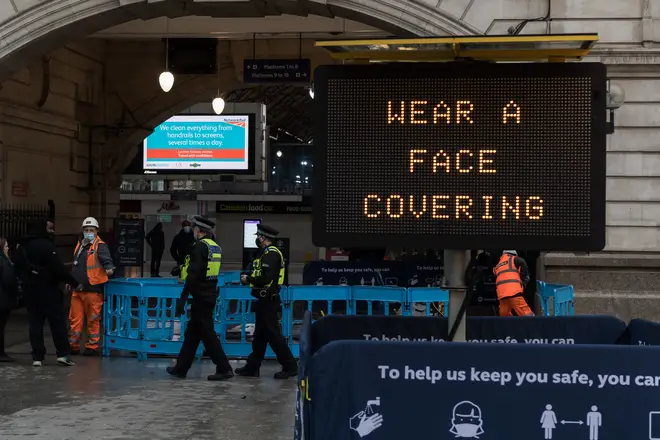
Richard Spurr 1am - 4am
24 December 2020, 17:49 | Updated: 24 December 2020, 18:09

574 more people have died within 28 days of testing positive for coronavirus, with over 39,000 new cases in the past 24 hours.
The Government said a further 574 people have died within 28 days of testing positive for Covid-19 as of Thursday, bringing the UK total to 69,625.
They said said as of 9am on Thursday, there had been a further 39,036 lab-confirmed cases of coronavirus in the UK.
Read more: Chelsea Pensioners offered 'early Christmas present' of Covid vaccine
Read more: Which new areas will enter Tier 4 and what are the new Christmas rules?
It brings the total number of cases in the UK to 2,188,587.
Separate figures published by the UK's statistics agencies for deaths where Covid-19 has been mentioned on the death certificate, together with additional data on deaths that have occurred in recent days, show there have now been 86,000 deaths involving Covid-19 in the UK.
Millions more people will be under the toughest coronavirus restrictions from Boxing Day - Tier 4 - as the UK implemented a travel ban on South Africa amid concerns over another new strain of Covid-19.

Matt Hancock announces further Tier 4 restrictions across England
The new statistics came as Public Health England revealed that London's rate of new cases of Covid-19 has trebled in just two weeks.
Their weekly surveillance report showed the city's rate stood at 602.2 cases per 100,000 people in the seven days to December 20, up from 200.3 in the seven days to December 6.
Rates have increased in all regions, with eastern England recording the next highest rate after London (440.7) followed by south-east England (380.6) and the West Midlands (218.8).
Case rates in England have risen across all age groups, with the biggest rise is among 20 to 29-year-olds, where the rate stood at 433.8 cases per 100,000 people in the seven days to December 20, up week-on-week from 267.2.
For 30 to 39 year-olds, the rate rose from 288.0 to 434.6 - the highest rate among all age groups.
Rates rose from 288.7 to 412.2 among 40 to 49-year-olds, and from 220.8 to 325.0 among 50 to 59-year-olds.
The UK implemented a travel ban on South Africa amid concerns over another new strain of Covid-19, which is feared to be more transmissible than that discovered in the UK.

Caller from Sweden says it was 'very very strange' seeing other countries in lockdown
Following disruption which has left thousands of lorry drivers stranded in Kent, Transport Secretary Grant Shapps said on Christmas Eve that ferries from Dover to Calais would run on Christmas Day and Boxing Day.
French firefighters and British military are working with NHS Test and Trace to test thousands of waiting hauliers, who must return a negative test within the past 72 hours to make the crossing.
Shortly after 1pm on Thursday, Mr Shapps said more than 2,000 lorry drivers waiting to leave had returned negative coronavirus tests, while three had tested positive.
"Kent haulier testing results to date - 2,367 tests carried out as of midday, of which: 2,364 negative 3 positive," he tweeted.
"As the EU Transport Commissioner has tweeted, testing hauliers is not recommended.
"Spending days in a lorry on your own puts you in an extremely low risk category."
More than 1,000 lorries have left the UK since Wednesday evening via the Eurotunnel, according to Duncan Buchanan, policy director for England and Wales at the Road Haulage Association.

Jenrick: Covid committee will meet later to consider 'further steps'
Around 2,000 more are expected to be able to leave by the end of Thursday, he added.
Meanwhile, the latest NHS Test and Trace figures show that 34.1% of people tested at an "in-person" site in the week ending December 16 received their result within 24 hours.
This is down from 59.8% in the previous week, and is the lowest percentage since the week to October 28.
New data from NHS England shows that more than 70% of people in England who have been given a vaccine for coronavirus were aged over 80.
Prime Minister Boris Johnson had already announced that more than 500,000 people had been given the first of two jabs, but figures show 521,594 were vaccinated between December 8 and December 20.
Some 366,715 of these were over 80, while the remaining 30% were care home residents under 80, care home staff and NHS workers.
These are the first figures published detailing the exact number of people to receive the Pfizer Covid-19 jab since Margaret Keenan became the first on December 8.
Priority groups in this initial phase - people aged 80 and over as well as care home residents and staff - were determined by the Government following advice from the Joint Committee on Vaccination and Immunisation.